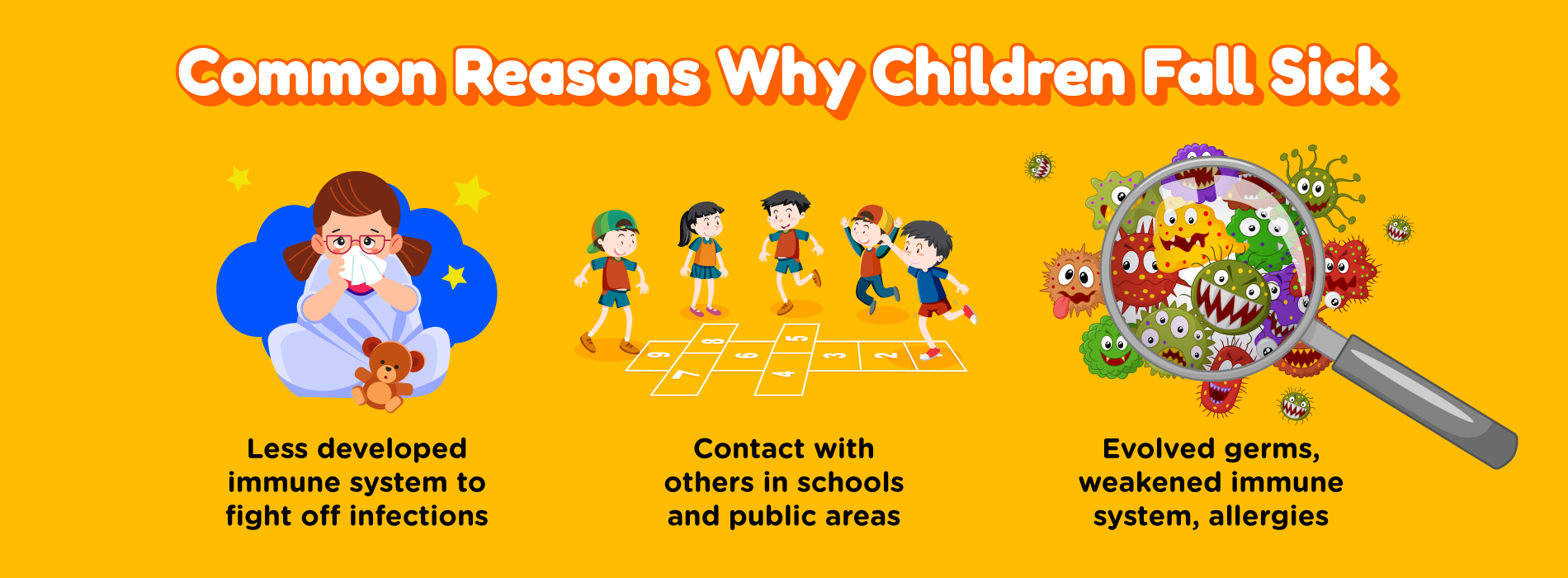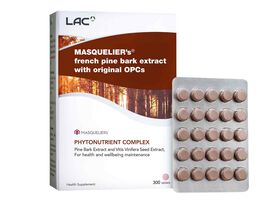Get Your Child Strong & Healthy!

Is your child always falling sick? Here are 4 steps to boost your child's immune system!
As parents, have you ever questioned yourself, “Why is my child always sick?” or “Does my child have a weak immune system?”
It always breaks the parents’ hearts whenever they see their little ones falling sick a little too often, especially when the child attends preschool or daycare centres. That’s because they are exposed to a lot of viruses and bacteria for the first time, making them vulnerable to catching infectious colds and flu. According to a study, it is normal for a child to catch a cold 8-10 times a year and for the symptoms to last up to 14 days[1].
Regardless, it is still crucial for the child to build a strong immune system in the first seven or eight years since their antibodies are not fully developed[2]. New environments will automatically increase the risk of a child encountering new germs that their body has yet to create the antibodies. If that is the case, isn’t it good for children to get sick so they can build up the antibodies? Not necessarily.
Building a strong foundation from a young age is fundamental in strengthening their antibodies to combat any potential infection, evolved germs and diseases in the future, ensuring a healthier future for the years to come.
Common Reasons Why Kids Fall Sick

Children are typically unaware of when they should cover their mouths, wash their hands or wipe their noses. Furthermore, toddlers often put toys and other foreign objects into their mouths leaving their immune systems particularly susceptible to picking up viruses easily.
To fight off viruses, the body needs to develop disease-specific antibodies that counter the exact pathogen that has invaded the immune system previously[3]. As a result, the body is able to recognize the exact pathogen and develops natural immunity to similar illnesses. Living in a fully sterilized environment is not only impossible but it isn’t good for immune systems either[4]. Children’s immune systems are uniquely designed to identify and respond to new infections and exposures, and that’s one way for the immune system to be trained.
While most viruses aren’t serious and treatable, some can be highly contagious and harmful to younger children. Parents need to take practical precautions to protect their children against these diseases. Fortunately, there are numerous precautions parents can take to minimise the risks of their children falling ill.
Steps To Boost Your Child’s Immune System
#1 Get Them Active
Keeping your child active can train their body to be resilient and fight off infections, especially if they are always exposed to the outdoors. Other than keeping your child healthy, it can also encourage stronger bones and muscles as well.
Set an hour away daily for your child to do something active per day, whether it is playing at the playground, playing sports with friends or going for a walk. As parents, you may motivate your child to stay active by doing fun activities together as a family during the weekends. Not only does this help the child stay active, it also creates an opportunity for the family to bond together.
#2 Serve Nutritious Food
Children need plenty of nutrients to grow and ultimately strengthen their immune system. It is highly recommended for children to have a balanced diet so that the condition of their white blood cells is optimised. A balanced diet includes lots of fruits and vegetables, whole grains, protein meat, healthy fats and calcium. Not to forget, water is extremely important to support the child’s immune system by flushing out toxins, maintaining body functions and delivering essential nutrients to every cell[5].
Besides eating nutritious food, supplements are also a great alternative in filling any nutritional gap. Vitamin C, Vitamin D, zinc, selenium, iron and protein are some vital vitamins to ensure the optimum function of immune cells. Additionally, opt for children's supplements with immune-boosting ingredients containing beta-glucan, elderberry, zinc and vitamin C as they help fasten recovery and aid in building back the body’s natural immunity against harmful bacteria.
It is okay to treat them occasionally but try limiting sugary snacks, drinks and unhealthy fats as they do more harm than good to the child.
#3 Practice Proper Handwashing
Train your child on how to wash their hands properly with soap each time after using the toilet, before and after mealtime or any time when they are exposed to dirt. Make this a habit at home so that they are trained wherever they are even without the supervision of their parents. Parents are encouraged to use fun methods to motivate their children to wash their hands by teaching them to sing a song or using a reward system like collecting stickers for each job well done.
Additionally, educate them to wash their hands each time they blow their nose or use their hands to close their mouth while coughing to stop the germs from spreading, especially in public areas.
#4 Cultivate Good Sleep Habits
Sufficient sleep is essential in maintaining a good immune system and this isn’t limited to adults but children as well. When we sleep, our immune system releases a type of protein called cytokines to aid in fighting infection and inflammation in the body. If we don’t get enough sleep, cytokine production is suppressed. In other words, lack of sleep lowers our immune system, leaving our bodies unable to fight off illnesses effectively and resulting in slower recovery.
It is highly recommended to fix a bedtime routine for your child by setting the same bedtime and wake-up time each day so they can stay disciplined as well as ensuring a good sleeping pattern every night. This allows the child’s body clock to stay consistent and get enough rest at night.
- Toddlers (one to two years old): 11 to 14 hours of sleep per day, including naps
- Preschoolers (three to five years old): 10 to 13 hours of sleep per day, including naps
- Primary-school children (six to 12 years old): 9 to 12 hours of sleep each night
- Teenagers (13 to 18): 8 to 10 hours of sleep each night
For older children, don’t forget to turn off any electronic devices at least an hour before bedtime to avoid melatonin disruption and sleeping patterns.
[1] https://mcpress.mayoclinic.org/parenting/the-constant-cold-why-kids-are-always-sick-and-what-to-do-about-it/
[2] https://www.reidhealth.org/blog/how-can-i-help-my-child-build-a-strong-immune-system#:~:text=A%20child's%20immune%20system%20is,against%20different%20types%20of%20germs.
[3] https://aurrumkids.com.au/prevent-child-from-getting-sick-at-daycare/
[4] https://mcpress.mayoclinic.org/parenting/the-constant-cold-why-kids-are-always-sick-and-what-to-do-about-it/
[5] https://www.multipure.com/purely-social/the-importance-of-clean-water-for-children/#:~:text=Clean%20drinking%20water%20is%20crucial,delivers%20essential%20nutrients%20to%20cells.








